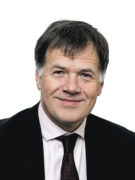My working life has changed so much in recent times. Two months ago, almost all my patient contact was face-to-face. Now, when a patient phones, rather than offer an appointment, my surgery staff will take a message and one of the GPs will assess the issue in the hope that their problem can be dealt with over the phone so that the patient doesn’t need to come in. I must confess I don’t like it. One-to-one relationships have always been the best part of this job.
It is eight weeks since I last saw a patient face to face because my own medical history means I am at increased risk from coronavirus, so my colleagues kindly keep me away from direct meetings with patients. I miss the human contact terribly. I didn’t become a GP to stay away from people. But there is lots to keep me busy and my days are spent on the phone and the computer. Patients are still seen if needed, of course, and their appointments are carefully arranged to keep patients with any coronavirus symptoms separate from others.
Before coronavirus, phone calls to and from patients were usually simple inquiries. What a difference a pandemic makes. They now cover the full spectrum of my speciality and it has taken time and practice for me to begin to realise that it is possible to provide a similar consultation on the phone to the ones I used to carry out, back in the good old days.
This took a major shift in my mindset. I must ask in much more detail about the patient’s symptoms, listen carefully without the benefits of gesture and body language, come to a clinical diagnosis, agree on the best way forward and plan a follow-up, all in the context of the patient’s overall health.
This did not come naturally at first and it felt like I was a medical student again, consciously aware that I was learning a new skill.
However, I realise that for many of my patients, phone consultations are convenient. Many of them appreciate not having to travel, then sit and wait to be seen; especially among strangers in a time of lockdown. I now accept that it’s often less essential than I thought for them to be physically present for me to treat them safely.
Another innovation we have been compelled to adopt is a video-based consultation system, known as NHS Near Me. At home in lockdown, many of us have embraced the ability to keep in touch with friends on Zoom, Skype and Face time but it seems odd to use it for consulting. We are acutely aware of our unflattering, pixelated appearance, shown from an odd angle and how do you maintain eye contact when looking at the person on the screen means our eyes drift off to one corner? Yet we persist. We all have new computer screens with cameras, microphones and speakers. I have found this method of remote consultation to be especially useful for patients with mental health problems. I can see the patient’s face, their body posture and, unlike phone consultations, we can have a silence, if we need one, that isn’t interrupted by: “Are you still there?”
One useful innovation in remote consulting is when a patient has a skin complaint and emails me a picture in advance of a call. One elderly, shielded patient was saved from having to travel in when the picture she emailed showed that a new skin lump was clearly a benign warty lesion, needing no immediate treatment and on another occasion, an emailed picture of a child’s eczema led me to forward it on to the dermatology liaison nurse so she could be co-opted for her expertise to assist.
So, are we all heading for a brave new world where general practice is remote and I can work from home in my pyjamas? Of course not. One patient reported she was suffering from abdominal pain. Her symptoms sounded like irritable bowel disease but without examining her abdomen and taking some bloods, I would not have been happy to reassure her down the phone. I would have much preferred to have seen her myself but while I am being protected, I asked her to come in and see one of my colleagues.
I hope I get these calls right. To ask everyone in would swamp our fragile system. To call in too few might delay a serious diagnosis.
For now, the health centre is settling down to a new normal. Patients have listened to our concerns that they weren’t coming in when they should, and we are once again seeing a more normal range of cases. But it’s still hard for us to plan our day and to provide the sort of continuity of care we would like.
I am looking forward to the day when I can call my patients from the waiting room into my consulting room again. There is something about the physical presence of two people that cannot be replicated by any other means. It is so much easier to reach an agreed understanding and there is the opportunity to reach out to reassure. And you can’t offer a tissue down the phone.
Dr Miles Mack is a GP in the Highlands and the former chairman of the Royal College of General Practitioners Scotland

